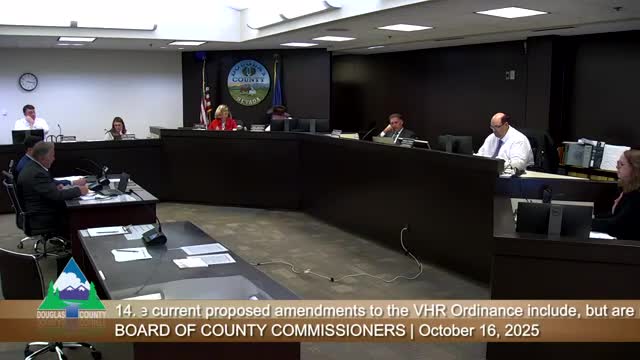Douglas County holds substantive first reading on vacation‑rental code tweaks including renter responsibilities and code of conduct
Get AI-powered insights, summaries, and transcripts
Subscribe
Summary
Douglas County commissioners held a substantive first reading of proposed amendments to Chapter 20.622, the county’s Lake Tahoe Vacation Home Rental code, consolidating renter rules into a single code-of-conduct and directing staff to rework language on responsible occupants and odors.
Douglas County commissioners held a substantive first reading of proposed amendments to Chapter 20.622, the county’s Lake Tahoe Vacation Home Rental (VHR) code, and directed staff to refine language after questions from board members and public commenters.
What changed in the draft: County staff and the VHR Advisory Board proposed consolidating renter requirements into a single “code of conduct,” clarifying local contact posting and insurance-notification requirements, and reorganizing enforcement and penalty language to reduce ambiguity. The draft also included non‑substantive reformatting of definitions and clarifying edits to special-area rules (for example, Glenbrook and Lincoln Park sections), adjustments to waitlist definitions, and a proposed minimum‑rental‑nights threshold for renewals (the draft set eight nights in the prior year as the renewal threshold).
Renter responsibility and “responsible occupant”: The board debated a key change that would require a party designated as responsible and at least 25 years old for each rental. Commissioners and the VHR advisory board discussed two tensions: owners who legitimately rent a unit for family members who will actually occupy the home, versus enforcement concerns when owners allegedly rent permits in name only and do not provide a responsible adult at the property. The board asked staff to rework the section so it requires a named, responsible adult (age threshold retained at 25 in the draft) without creating an impractical requirement that that person be physically on-site at all times.
Code of conduct, odors, fire pits and marijuana: The proposed “code of conduct” gathers existing renter expectations (no disorderly, lewd or indecent conduct; noise controls; parking rules; fire‑safety restrictions) into a single place in Chapter 20.622. Commissioners agreed to keep the disorderly/lewd clause. They were divided on whether to explicitly prohibit “obnoxious odors”; staff and counsel proposed replacing a vague odor ban with a “reasonable person” standard that bans smoke or fumes that unreasonably intrude on neighboring properties. The County Attorney’s office advised a reasonableness standard is workable and enforceable — similar to how noise is enforced.
Enforcement and administrative changes: Staff explained much of the redline reorganization simply places procedural enforcement language in one section (notice, appeal, fines) rather than changing penalties; it also clarifies that a revoked permit remains subject to fines. The planning commission and the VHR advisory board reviewed the proposals; some advisory-board suggestions (for example, mandatory local contact callbacks to complainants) were rejected by the planning commission and therefore not included in the staff’s preferred draft.
Public comment and board direction: Multiple neighborhood representatives and VHR owners testified. The VHR Advisory Board chair and the Planning Commission chair presented their recommendations; VHR board chair Keith Bayer asked the county to keep a rule that requires a responsible adult on the rental record after an incident earlier this year where underage guests were cited. Several residents asked for stronger enforcement and clearer posting of emergency contacts, and others asked that Glenbrook-specific rules reflect the homeowners’ association practice. Commissioners asked staff to draft clearer, enforceable language that: (1) requires a named responsible adult (age requirement retained) or owner designation for each rental, (2) standardizes how the rental code-of-conduct is presented in ads and on-site postings, and (3) rewrites the renewal-proof standard (rental nights) so it is enforceable and not arbitrary.
Next steps: The item will return for a refined first-reading presentation (staff indicated the next substantive introduction will show updated language) and later a second reading with full public comment and a vote. Staff will prepare a consolidated, plain-language version of Chapter 20.622 that reflects the board’s direction and the VHR advisory and planning commission input.
Ending: The substantive first reading did not adopt the ordinance; commissioners endorsed consolidation of renter rules but asked staff and counsel to reword the responsible‑occupant and odor language to be enforceable and to return with a cleaned-up draft for further public review.
